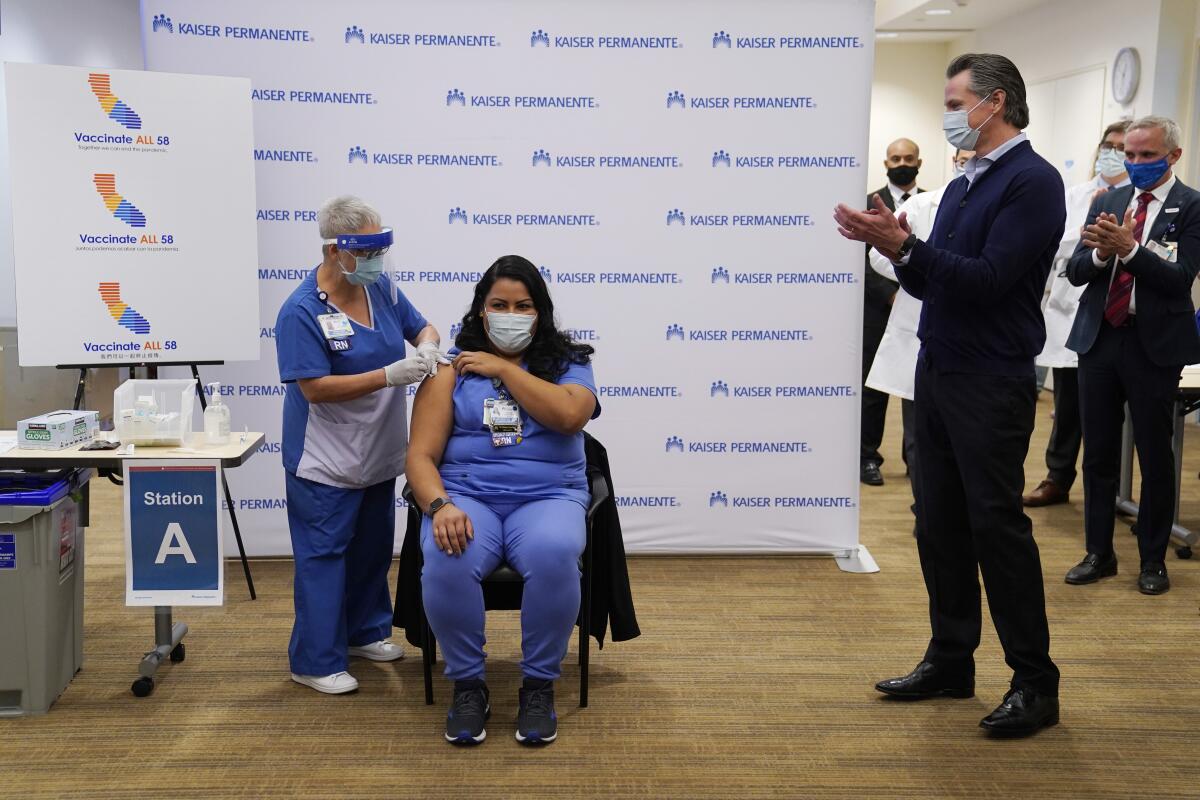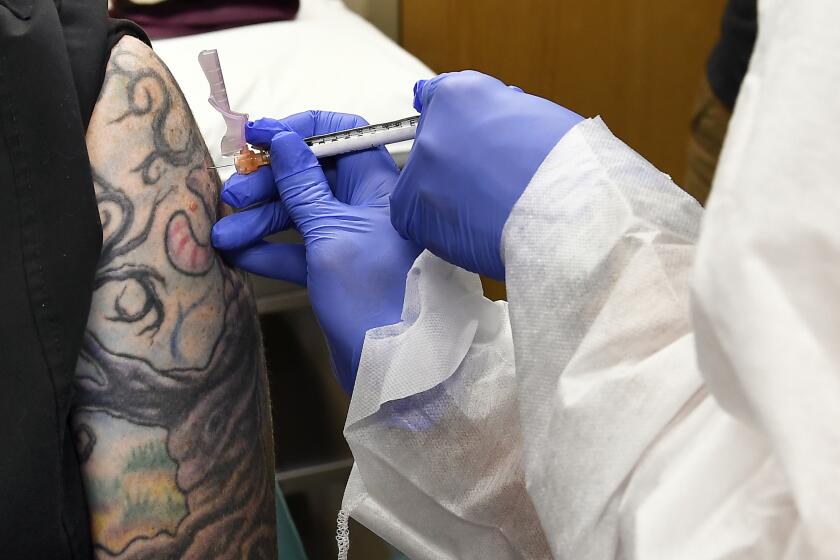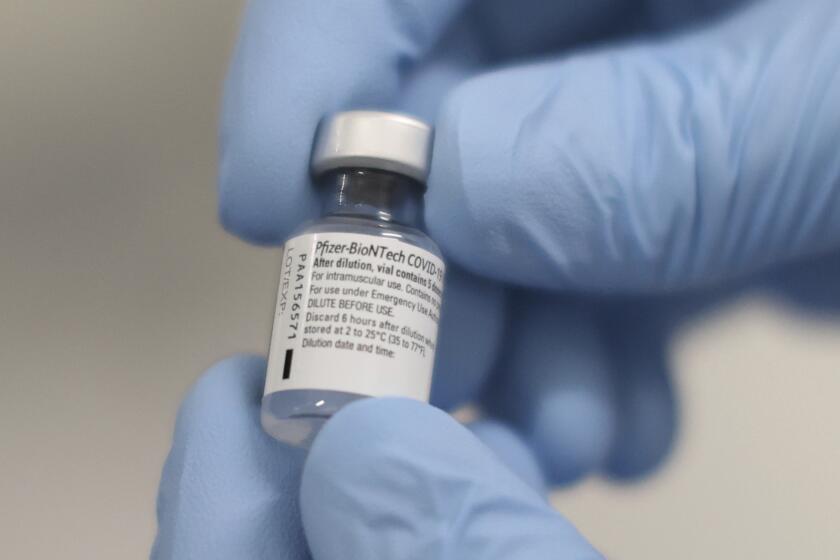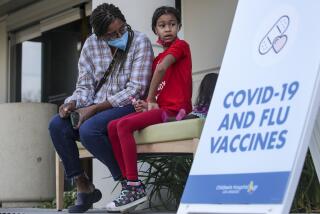COVID-19 vaccine side effects: What you need to know

- Share via
For most people, the only side effects of the Pfizer-BioNTech vaccine against COVID-19, rolling out now in California and across the U.S., might be some arm pain where you get the shot, of course, and some flu-like symptoms. Most people in the clinical trial reported that their side effects went away after about two days.
Some reports have surfaced regarding allergic reactions, so people with severe allergies should discuss their health history and any risks with their doctor before getting the shot.
Here’s what Pfizer lists as side effects reported in its clinical trial, along with the percentage of people age 18 to 55 who reported them after the first dose:
- Redness at injection site (4.5%)
- Swelling at injection site (5.8%)
- Pain at injection site (83.1%)
- Fever (3.7%)
- Fatigue (47.4%)
- Headache (41.9%)
- Chills (14%)
- Vomiting (1.2%)
- Diarrhea (11.1%)
- New or worsened muscle pain (21.3%)
- New or worsened joint pain (11%)
People older than 55 reported side effects at slightly lower rates. You can read detailed reports about side effects in section 6.1 here.
Dr. Anthony Fauci, director of the National Institute of Allergy and Infectious Diseases, discusses side effects of the vaccine at about the 16-minute mark in a video conversation with the editor of the Journal of the American Medical Assn.
If the COVID-19 vaccine from Pfizer and BioNTech was good enough to get a nod from the FDA, the vaccine from Moderna and the NIH almost certainly is as well.
As for allergic reactions, the U.S. Centers for Disease Control and Prevention recommends that people who have had severe allergic reactions, such as anaphylaxis, to other vaccines or injectable medications should be monitored for 30 minutes if they receive the shot. (Anaphylaxis is a life-threatening allergic reaction that can occur within minutes of exposure to an allergen.)
The CDC recommends that people who have other allergies, such as to food or pets, should be vaccinated. You’ll talk to your doctor first and be monitored for 15 minutes after your injection.
People who have had severe allergic reactions to any components of the Pfizer vaccine should not receive the shot.
Here’s the list of the exact components in the vaccine from the prescribing documentation:
“The Pfizer-BioNTech COVID-19 Vaccine is supplied as a frozen suspension in multiple dose vials; each vial must be diluted with 1.8 mL of sterile 0.9% Sodium Chloride Injection, USP prior to use to form the vaccine.
“Each dose of the Pfizer-BioNTech COVID-19 Vaccine contains 30 mcg of a nucleoside-modified messenger RNA (modRNA) encoding the viral spike (S) glycoprotein of SARS-CoV-2.
“Each dose of the Pfizer-BioNTech COVID-19 Vaccine also includes the following ingredients: lipids (0.43 mg (4-hydroxybutyl)azanediyl)bis(hexane-6,1-diyl)bis(2-hexyldecanoate), 0.05 mg 2[(polyethylene glycol)-2000]-N,N-ditetradecylacetamide, 0.09 mg 1,2-distearoyl-sn-glycero-3-phosphocholine, and 0.2 mg cholesterol), 0.01 mg potassium chloride, 0.01 mg monobasic potassium phosphate, 0.36 mg sodium chloride, 0.07 mg dibasic sodium phosphate dihydrate, and 6 mg sucrose. The diluent (0.9% Sodium Chloride Injection, USP) contributes an additional 2.16 mg sodium chloride per dose.
“The Pfizer-BioNTech COVID-19 Vaccine does not contain preservative. The vial stoppers are not made with natural rubber latex.”
The COVID-19 vaccine from Pfizer and BioNTech that has been approved for emergency use was subject to well-established procedures to evaluate vaccine safety by scientists at the U.S. Food and Drug Administration and elsewhere. California and other Western states have also endorsed the Pfizer vaccine’s safety. Early on in Britain’s first vaccinations, two people may have had allergic reactions, but they recovered.
For more questions and answers about COVID-19 vaccines, see our FAQ.
COVID-19 vaccines are now being administered to healthcare workers in the U.S. What are your questions about the timeline, the safety or the science?








